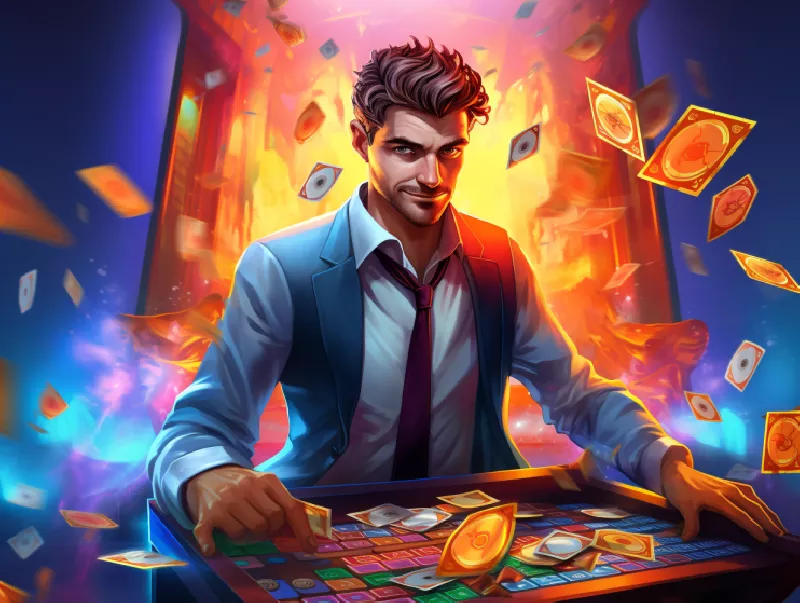Welcome to the Lucky Cola online casino blog! Today, we delve into the world of poker, specifically, the inevitable bad beats that every player encounters. Bad beats in poker are not just about losing a hand; they're about losing a hand you were statistically favored to win. It's a part of the game that can be frustrating, especially for new players. However, understanding why they occur and how to cope with them can significantly improve your gameplay. In this article, we will share 5 effective coping strategies that can help you turn the tables around. So, whether you're a seasoned player at Hawkplay or a newbie at SuperAce88, these tips are certain to give you an edge in your next poker game. Stay tuned!
Understanding Bad Beats
In the vibrant world of poker, 'bad beats' is a term that often sends shivers down the spine of even the most seasoned players. In essence, a bad beat is when you lose a hand despite having a strong set of cards, mainly due to sheer luck on the part of your opponent. It's like a sudden twist in a movie plot where the hero, despite having all the odds in his favor, faces an unexpected defeat.
Bad beats are not anomalies but inherent aspects of poker, a game that thrives on the unpredictable blend of skill and chance. They can occur in any game variant, from the classic Texas Hold'em to the digital Lucky Cola Baccarat.
Understanding bad beats is crucial to poker strategy because it allows players to come to terms with the role of luck in the game. It's a stark reminder that poker is not just about the cards you're dealt but also about how you play them and how luck factors into the equation.
The Psychological Impact of Bad Beats
Bad beats in poker can have a significant psychological impact on players. The sudden shift from a winning position to a losing one can be a hard pill to swallow, leading to feelings of frustration, disappointment, and even anger. It's not unusual for players to question their skills or strategy after a bad beat, which can shake their confidence in subsequent games.
"Bad beats can be a mental test, pushing players to the edge of their emotional resilience. It's not just about losing a hand; it's about dealing with the unpredictability of the game and maintaining composure despite the odds." - Andrea Domingo, Chairperson and CEO of PAGCORHowever, it's crucial to remember that bad beats are part and parcel of the poker landscape. They are a testament to the game's unpredictable nature, which is what makes poker so exciting and challenging. Dealing with bad beats effectively is more about managing your emotions and maintaining a positive mindset. It's about understanding that you can play your cards right and still lose, and that's okay. It doesn't make you a bad player; it just means that luck wasn't on your side in that particular hand. Remember, poker is a long-term game. Don't let a single bad beat affect your overall strategy or dampen your love for the game. Instead, use it as a learning experience to improve your emotional resilience and prepare for future games.
5 Coping Strategies for Bad Beats in Poker

In the world of poker, bad beats are an inevitable part of the game. It's a term that signifies a situation where a player with a strong hand loses to an opponent who had a statistically lesser chance of winning. When faced with a bad beat, it's crucial to have coping strategies in place. Here are five effective strategies to help you navigate through these challenging situations.
- Stay Rational: It's easy to let emotions run high after experiencing a bad beat. However, it's essential to remember that poker is a game of luck and skill. No matter how well you play, there's always a chance of losing to a less likely hand. Keep your emotions in check and stay rational.
- Review Your Play: After a bad beat, take the time to review your play. Did you make the right decisions? Could you have played it differently? Use it as a learning opportunity to improve your game. Remember, even the best players in the world suffer bad beats.
- Take a Break: If a bad beat is affecting your game, it might be time to take a break. Step away from the table, take a deep breath, and regroup. It can help you regain your focus and composure.
- Stay Positive: Keeping a positive mindset is crucial in poker. Even after a bad beat, stay optimistic. Remember, it's just one hand in a long session or tournament. Your luck can turn around in the next hand.
- Practice Bankroll Management: Good bankroll management can help cushion the blow of a bad beat. Ensure you're not playing stakes too high for your bankroll. This way, a single bad beat won't have a significant impact on your overall funds.
In conclusion, coping with bad beats is a crucial part of your poker strategy. By staying rational, reviewing your play, taking breaks, staying positive, and practicing good bankroll management, you can effectively navigate through these situations and improve your overall game. Read more about poker strategy in our Winning Strategies for Pai Gow Poker post.
How Top Poker Players Handle Bad Beats
Every poker player, even the pros, experiences bad beats. The difference between an average player and a top player is how they handle these situations. Here are examples of how three professional poker players deal with bad beats.
| Player | Strategy |
|---|---|
| Daniel Negreanu | Daniel uses a rational approach. He understands that bad beats are part of the game and focuses on making the right decisions rather than the outcome of a single hand. |
| Phil Ivey | Phil is known for his stoic demeanor at the table. He doesn't let bad beats affect his game. Instead, he remains focused and continues to play his A-game. |
| Vanessa Selbst | Vanessa believes in taking breaks. If a bad beat affects her game, she steps away from the table to regroup and regain her focus. |
In summary, top poker players understand that bad beats are part of the game. They focus on the things they can control, like their decisions, rather than the things they can't, like the outcome of a hand. Learn more about the mindset of top players in our Esports Millionaires post.
Turning Bad Beats into Learning Opportunities
Every poker player, from the novice to the seasoned professional, experiences bad beats. These are moments where despite having a strong hand and playing strategically, luck takes an unexpected turn, and you lose the round. It's a common occurrence in poker, but it doesn't have to be a negative experience. Instead, it can be an invaluable learning opportunity.
- Analyze Your Play: After a bad beat, review your gameplay. Consider your decisions and the outcomes. This can help you identify any mistakes or areas for improvement.
- Understand the Odds: Poker is a game of chance as much as it is strategy. Understanding the odds can help you make better decisions and anticipate potential bad beats.
- Embrace the Challenge: Bad beats are a part of the game. Accept them as challenges to overcome, rather than setbacks. This mindset can help you stay focused and determined.
- Learn from Others: Watch how other players handle bad beats. You can learn valuable strategies and tips from their experiences.
- Practice Patience: Patience is key in poker. Bad beats can test your patience, but don't let them influence your gameplay. Stay calm, think clearly, and make strategic decisions.
Remember, every bad beat is a chance to learn and improve. Use these experiences to refine your poker strategy and become a stronger player. As Alfredo Lim, President of PAGCOR, once said, "Every setback is a setup for a comeback."
Final Thoughts and Call to Action
Turning Bad Beats into Wins
Bad beats may be disappointing, but they are inevitable in poker. The key is not to avoid them, but to learn from them. By analyzing your play, understanding the odds, embracing challenges, learning from others, and practicing patience, you can turn bad beats into powerful learning opportunities. This will enhance your poker strategy and increase your chances of winning in the long run.
Are you ready to put these strategies to the test? Join us at Lucky Cola, where you can play a variety of poker games and apply your newly learned strategies. Remember, every game is a chance to learn and improve. So, don't be discouraged by bad beats; instead, use them as stepping stones to becoming a better poker player. Good luck!







